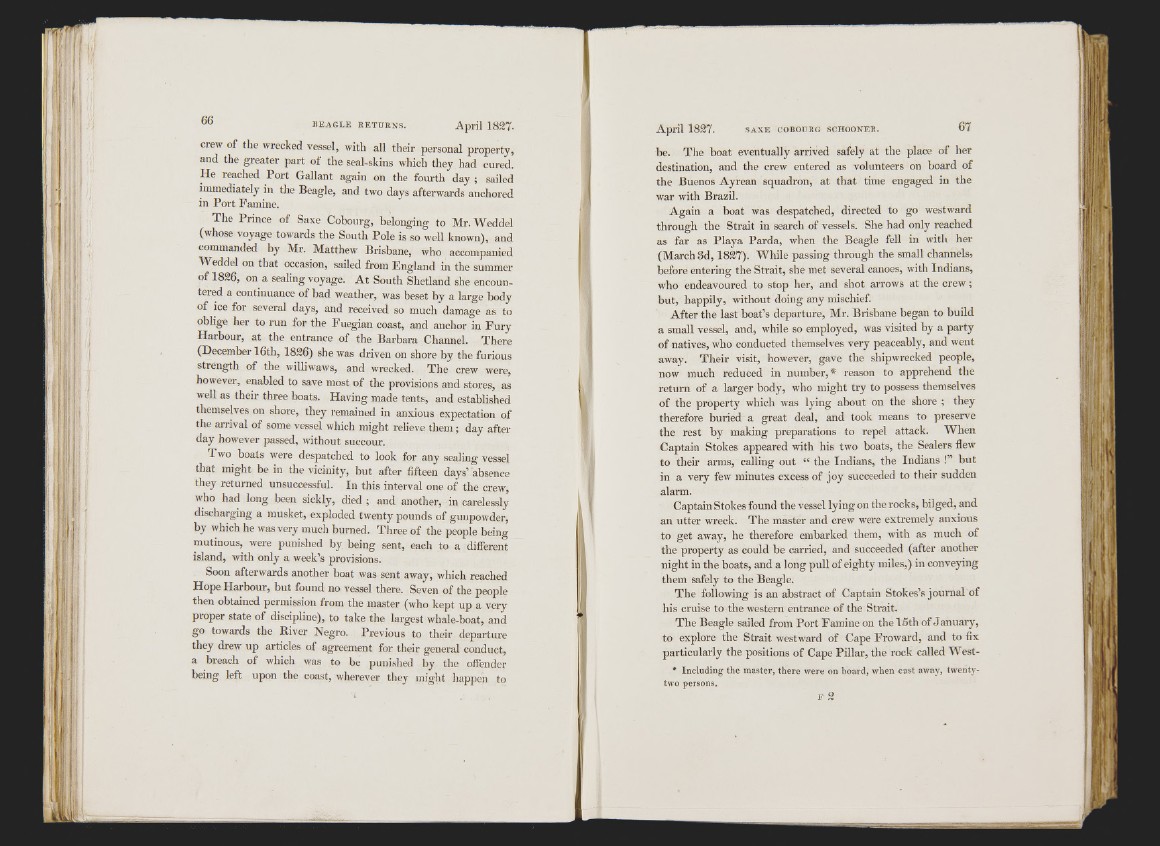
C6 BEAGLE KETUKNS. April 1827.
creiv of the ivrecked vessel, with all their personal property,
and the greater part of the seal-skins which they had cured.
He reached Port Gallant again on the fourth day ; sailed
nnmediately in the Beagle, and two days afterwards anchored
in Port Famine.
The Prince of Saxe Cobourg, belonging to Mr. Weddel
(whose voyage towards the South Pole is so well known), and
commanded by Mr. Matthew Brisbane, who accompanied
Weddel on that occasion, sailed from Fngland in the summer
of 1826, on a sealing voyage. A t South Shetland she encountered
a continuance of bad weather, was beset by a large body
of ice for several days, and received so much damage as to
oblige her to run for the Fuegian coast, and anchor in Fury
Harbour, at the entrance of the Barbara Channel. There
(December 16th, 1826) she was driven on shore by the furious
strength of the AvilliwaAvs, and wrecked. The crew were,
however, enabled to save most of the provisions and stores, as
well as their three boats. Having made tents, and established
themselves on shore, they remained in anxious expectation of
the arrival of some vessel which might relieve them ; day after
day however passed, Avithout succour.
Two boats were despatched to look for any sealing vessel
that might be in the vicinity, but after fifteen days’ absence
they returned unsuccessful. In this interval one of the crew,
who had long been sickly, died ; and another, in carelessly
discharging a musket, exploded twenty pounds of gunpowder,
by which he was very much burned. Three of the people being
mutinous, were punished by being sent, each to a different
island, Avith only a week’s provisions.
Soon afterAvards another boat was sent away, which reached
Hope Harbour, but found no vessel there. Seven of the people
then obtained permission from the master (who kept up a very
proper state of discipline), to take the largest whale-boat, and
go towards the River Negro. Previous to their departure
they drew up articles of agreement for their general conduct,
a breach of which was to be puni.shed by the offender
being left upon tlie coast, wherever they might happen to
April 1827. SAXE COBOURG SCHOONER. 67
be. T h e boat eventually arrived safely at the place of her
destination, and the crew entered as volunteers on board of
th e Buenos Ayrean squadron, a t th a t time engaged in th e
Avar with Brazil.
Ag a in a boat was despatched, directed to go westward
th ro u g h the Stra it in search of vessels. She had only reached
as far as P lay a Pa rd a , when the Beagle fell in with he r
(M a rchS d , 1827). W h ile passing th rough the small channels,
before entering the Strait, she met several canoes, Avith Indians,
who endeavoured to stop her, and shot arrows at the c rew ;
b u t, happily, without doing any mischief.
Afte r th e last boat’s departure, Mr. Brisbane began to bu ild
a small vessel, and, while so employed, Avas visited by a p a rty
o f natives, who conducted themselves very peaceably, and went
away. T h e ir visit, however, gave the shipwrecked people,
now much reduced in num b er,* reason to apprehend the
re tu rn of a larger body, Avho might try to possess themselves
o f th e property which was lying about on the shore ; they
therefore buried a great deal, and took means to preserve
the re st b y making preparations to repel attack. W h en
Captain Stokes appeared with his tAvo boats, the Sealers fleAv
to their arms, calling ou t “ the Indians, the Indians !” b u t
in a very few minutes excess of jo y succeeded to their sudden
alarm.
Captain Stokes found the vessel lying on the rocks, bilged, and
an u tte r wreck. T h e master and crew were extremely anxious
to get away, he therefore embarked them, Avith as much of
the property as could be carried, and succeeded (after another
n ig h t in the boats, and a long p u ll o f eighty miles,) in conveying
them safely to the Beagle.
The folloAving is an abstract of Captain Stokes’s journal of
his cruise to the western entrance of the Strait.
The Beagle sailed from Port Famine on the 15th of January,
to explore the Strait Avestward of Cape FroAvard, and to fix
particularly the positions of Cape Pillar, the rock called West-
• Including the master, there were on board, when cast aAvay, tAventy-
two persons.
F 2
:l< tl
IL'